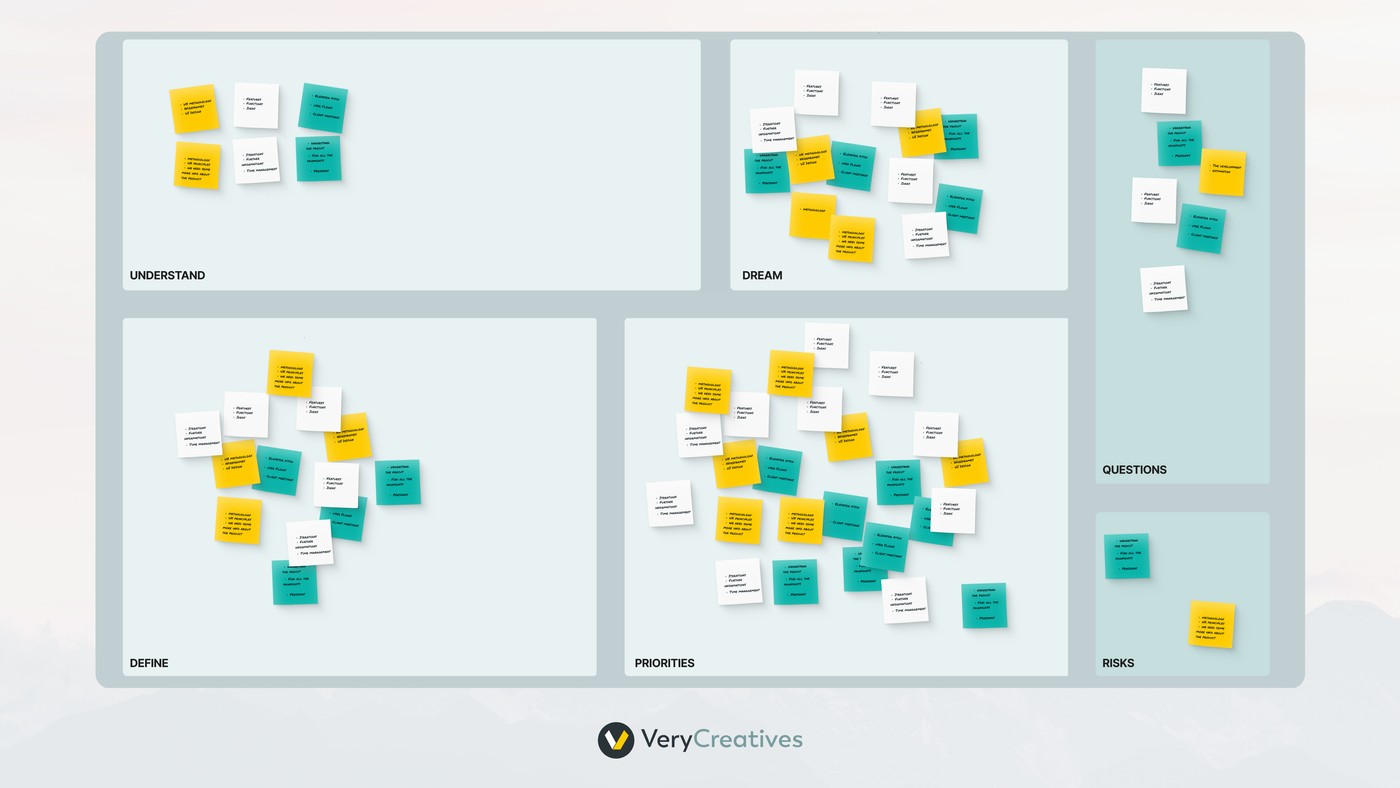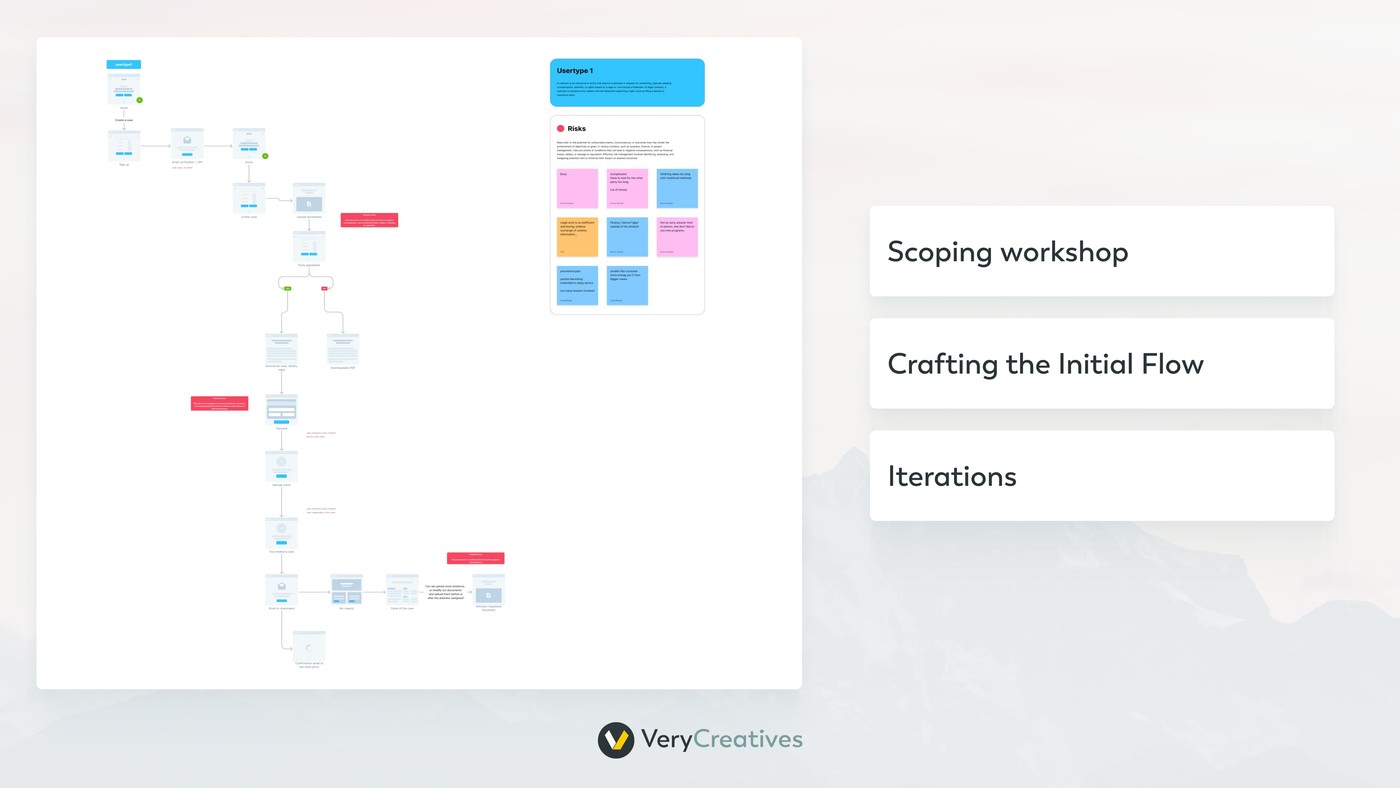A Scoping Workshop is a structured series of meetings, typically spanning one or more days. These sessions bring together all key stakeholders—such as sales teams, IT professionals, and the software vendor’s team—to collaboratively discuss the details of a product or project.
The workshop’s primary objectives are to clarify the project’s requirements, identify overlooked areas, assess potential risks, and establish a clear project scope.
Scoping Workshop Explained
For business owners, startup founders, or entrepreneurs collaborating with a development team, a Scoping Workshop provides a structured way to clearly communicate your needs, review project details, and estimate costs.
This workshop lays a strong foundation for success by reducing risks and saving money. Adjustments made during the planning phase are significantly more cost-effective than changes made during development. By aligning everyone’s understanding of the project, the workshop helps minimize unexpected challenges later on.
Sometimes referred to as a Product Strategy Workshop, this process focuses on ensuring a smooth MVP development. While the terms may overlap in purpose, they often differ in scope and approach.
Difference Between Scoping Workshop and Product Strategy Workshop
While both a Scoping Workshop and a Product Strategy Workshop aim to align the project team and ensure a shared understanding, their focus and timing differ significantly.
A Scoping Workshop is typically the first step. It concentrates on defining the project’s boundaries, gathering requirements, and outlining the foundational details. Held before any work begins, this workshop culminates in a Statement of Work (SOW), which specifies the project’s scope, timeline, costs, tasks, and goals.
In contrast, a product strategy workshop is centered on shaping the product vision, identifying the target market, and defining the unique value proposition. Its outcome is a comprehensive product strategy framework, including a product roadmap and go-to-market plan.
What is the Purpose of a Scoping Workshop?
Without proper planning in project development, projects often fall victim to “scope creep,” where unplanned changes or additional features exceed the original objectives.

Scope creep can be particularly detrimental during the MVP phase, leading to issues such as:
- Wasted Engineering Hours: Developing features that customers don’t need.
- Time Delays: Extra work extends deadlines.
- Cost Overruns: Additional features increase expenses.
- Resource Drain: The team becomes overburdened.
- Lower Team Morale: Unplanned changes frustrate the team.
- Quality Risks: Rushed work compromises quality.
Even planned changes can be costly during the MVP phase, as they require revisiting timelines, budgets, and resources. This is why Scoping Workshops are so critical.
Based on our past experience, investing time in these workshops has been shown to reduce overall project time and costs by approximately 20-30%.
The primary goal of an MVP Scoping Workshop is to mitigate risks and keep the project aligned with business objectives and timelines.

Benefits of a Scoping Workshop
1. Enhances Understanding of the Product and Market
During the workshop, teams conduct user research and analyze the target market. This ensures all stakeholders gain a deeper understanding of the product’s purpose, users, and value.
2. Defines the Product’s Scope
The workshop clarifies the product’s features, specifying what will and won’t be included. Goals are established from both business and technical perspectives, helping set clear priorities and milestones.
3. Cost-effective
By aligning the team’s understanding of the product’s requirements, the workshop minimizes unnecessary expenses. Early adjustments help the project stay within budget, avoiding costly revisions later.
4. Thorough Product Analysis
The workshop involves in-depth analysis, including business, technical, and creative aspects. The team examines core features, explores new solutions, and researches competitors’ products. This ensures the product is according to the needs of its target users.
5. Organizes all Product Details
A detailed product plan is developed, covering timelines, features, and user tasks. This ensures everyone has easy access to key information, fostering clarity and alignment throughout the project.
6. Identifies Opportunities, Strengths, and Weaknesses
Through tools like SWOT analysis and market research, the workshop uncovers challenges and highlights areas for improvement. This enables the team to address gaps, capitalize on opportunities, and refine the product effectively.
Important Questions to Address Before a Scoping Workshop
These questions ensure the scoping session is detailed, focused, and productive:
- What are the main problems we aim to solve with this product?
- Who will use this product, and what are their goals?
- Who will be responsible for gathering the product requirements?
- Who should participate in the scoping workshop, and who else can provide valuable input?
- What is the timeline for developing the MVP?
- What is the budget for the project?
- When do we plan to begin development?
- What benefits will the MVP deliver to both users and the organization?
What Happens During an MVP Scoping Workshop?
While the details of a scoping workshop vary by project, certain steps are generally consistent. A skilled development team will tailor the workshop to the client’s specific needs. At VeryCreatives, we use a flexible framework refined through experience, adapting it to fit the unique demands of each project. Depending on the project’s scope, the workshop may last a few hours or extend over multiple days.
Here’s a typical breakdown of what happens during a scoping workshop:
1. Gathering the Right People
The workshop requires the right participants from both sides.
- Client side: The Founder, Product Owner (if available), and others who bring valuable industry-specific insights.
- Development team: A Product Strategist or Project Manager, Tech Lead, and Product Design Expert.
2. Getting to Know Each Other
The workshop provides an opportunity to assess team dynamics. Early collaboration helps identify potential challenges and ensures both teams can work effectively together.
3. Understanding the Goal
Defining the project’s objectives is a key step. What problem is being solved? What is the unique selling point (USP)? Together, we craft a clear project scope statement to align all parties on the project’s direction.
4. Brainstorming Solutions
Projects often have multiple possible approaches. The workshop creates a space for brainstorming and exploring the best solutions. Clients ask questions, and the development team offers insights and options.
5. Prioritizing the Project
We identify the project’s priorities during the session, gathering the information needed to prepare a detailed report. This includes a product roadmap, timeline, cost estimates, and other critical elements.
6. Scheduling the Work
A key outcome of the workshop is a timeline with milestones and regular check-ins. This ensures tasks are well-organized, progress is smooth, and deadlines are met.
7. Informal and Collaborative Environment
To encourage open communication, we maintain a casual and friendly atmosphere with regular breaks. We avoid overly strict rules—like banning phones or computers—to create a positive and productive environment.
What You Can Expect After Our Scoping Workshop
By the end of the workshop, you’ll receive:
- A realistic MVP scope.
- A timeline for the project.
- A detailed budget.
- Initial technical assumptions.
- Clearly defined roles and responsibilities.
Following the workshop, we take a few days to analyze and refine the information gathered. This ensures we fully understand the collaboration framework and can provide a clear outline of the next steps.
What we Offer
For non-technical founders or companies aiming to launch a digital product, an MVP Scoping Workshop is an essential first step.
At VeryCreatives, we charge for this workshop to ensure the involvement of our senior team members and to deliver maximum value. This investment simplifies and streamlines the entire project.
If you choose to move forward with us for the development phase, the workshop cost will be deducted from your first monthly bill.
There’s no obligation to commit to us after the workshop. You’re welcome to take the deliverables to another development team if you prefer. However, most clients choose to continue working with us, a testament to the quality and dedication we bring to every project.
Book a discovery call today, and let’s explore how we can help you achieve your goals.
Frequently Asked Questions
Who should attend the scoping workshop?
Your team should include key decision-makers and relevant subject matter experts (SMEs) from your organization. This may involve leaders from IT, sales, and other departments involved in the project.
Having the product owner or main decision-maker present is essential to ensure alignment across the organization.
Additionally, IT and data teams should participate to assess how the new system will integrate with existing technologies and processes.
How Much Should I Prepare in Advance?
Thorough preparation is crucial for a productive workshop. The better prepared you are, the smoother the process and outcomes will be. Collect materials such as process flow diagrams, functional requirements, and system architecture documentation.
Bring along relevant samples, such as data reports, agreements, or pricing lists. Ensure your IT team shares necessary details about your current technology stack and its integration with the new system.
How Long Should a Scoping Workshop Be?
The duration depends on the project’s complexity and the level of preparation.
- Standard duration: 2 to 3 days, with each session lasting about 4 hours.
- In-person workshops: These are often more effective for brainstorming and tackling complex topics, allowing more ground to be covered quickly.
- Simpler projects: 1 to 2 full days might suffice.
While online workshops are common, in-person or hybrid formats generally yield better results for detailed discussions.